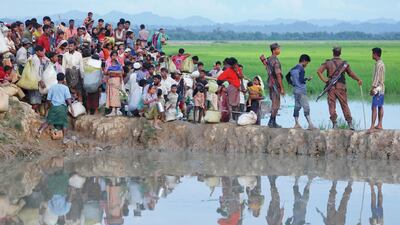The picture of a child crying amid a group of elders waiting for food in Bangladesh (What will the Rohingya face when they return home in a month? (December 26) was heartbreaking to see.
The military is supposed to protect civilians from predators, not be the enemies themselves. Instead, in Myanmar, they rape and torture innocent women and children. What we hear in the media is probably nothing compared with the situation on the ground. Pictures tell harrowing tales of their plight. The videos of people fleeing to safety are shocking.
The disappointing fact remains that no one has been able to stop these crimes on innocent civilians among the Rohingya. Temporary shelters harbour the tears and anguish of many who eagerly await the assistance from affluent individuals and neighbouring countries.
The world has now officially borne witness to how a leader like Aung San Suu Kyi responded to a genuine humanitarian crisis that befell her citizens on her watch.
Ramachandran Nair, Oman
India should have prepped before introducing new legislation
I refer to your article India to leapfrog UK and France in 2018 (December 26). Douglas McWilliams, deputy chairman of the Centre for Economics and Business Research, has said that India's growth has been slowed by restrictions on high-value banknotes and a new sales tax.
He has, however, predicted that India is on the way to becoming the fifth largest economy in the world. Demonetisation and the introduction of the general sales tax (GST) could indeed have been better managed by India's finance ministry. In both these major financial decisions, details had yet to be worked out, process manuals had not been prepared. As a result, people continue to face difficulties and the economy has suffered. In short, the need to score some quick political victories made the government announce some big-bang policies without adequate preparation. The take-home lesson is that whenever we introduce new policies, detailed manuals should be posted online for the benefit of businessmen and citizens.
Rajendra Aneja, Dubai
Why do we forget how dangerous it is to overtake on small roads?
I refer to your article Twenty killed in Philippines bus crash on way to Christmas mass (December 26). It was harrowing to read that the victims were all from the same family. Their driver brought them to their fate by recklessly attempting to overtake a larger bus. This is a perfect example of how dangerous overtaking can be on narrow roads.
K Ragavan, India
Extremist thought is fueled by inequality and exclusion
I refer to your article Down but not out: ISIL will regroup and rise again (December 25). Never mind the names of these groups, whether ISIL, ISIS, IS, Al Qaeda or others. Until we are able to defeat the root causes that fuel the minds of certain people with hatred, of course they will come back again, whether with this or another name. When justice, wealth and other such factors are ensured, the risk of radicalism is reduced. If we look at the most peaceful countries in the world or the happiest with the highest quality of living, the majority, if not all, of its people have access to healthcare, education and other government services.
Nicola Siotto, Dubai

